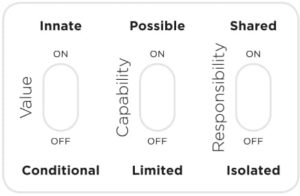
Psychological Safety, Failure, and Compassionate Accountability
Share viaPsychological safety is necessary in order for failure to become a stepping stone to success. But is it sufficient? Compassionate Accountability reveals three key ingredients for turning failure into excellence.
Psychological Safety and Failure
Amy Edmonson is a Harvard Business School professor and the pioneer of the concept of psychological safety. In her new book, The Right Kind of Wrong: The Science of Failing Well, Dr. Edmonson shares a powerful story of how failure led to the discovery of psychological safety, and how psychological safety is the foundation for being able to fail well.
Psychological safety describes the conditions where we can be ourselves and get vulnerable without fear of it being used against us. As Dr. Edmonson argues psychological safety plays a powerful role in the science of failing well. She explains it this way in her new book;
“It allows people to ask for help when they are in over their heads, which helps eliminate preventable failures. It helps them report — and hence catch and correct — errors to avoid worse outcomes, and it makes it possible to experiment in thoughtful ways to generate new discoveries.” – pg 15
The Compassion Mindset
The Compassion Mindset overlaps with and extends psychological safety to include a commitment to excellence, performance, and continuous improvement.
The Compassion Mindset consists of Three Switches; Value, Capability, and Responsibility

Each switch captures a critical attitude and set of behaviors that, when applied together, foster Compassionate Accountability®.
Value: Seeing a person’s value as innate allows us to see and affirm them for who they are, including their feelings and lived experiences. This is step one for psychological safety.
Capability: Seeing a person’s capability as possible means we believe in them, we invite their perspectives, skills, ideas, and contributions. We value their input and stay curious. This is step two for psychological safety since it sets the stage for learning from failure.
Responsibility: Seeing each of us as 100% responsible for our feelings, thoughts, and behaviors means we share responsibility for excellence by owning our part, and inviting others to do the same. This goes beyond psychological safety and is the third ingredient for Compassionate Accountability.
Turning Failure into Excellence with Compassionate Accountability
Pursuing excellence and meeting the highest performance goals can’t happen without all three switches. Value creates a safe place for us to share our experiences. Capability creates a curious space to learn from failure. And Responsibility reinforces our commitment to doing better in the future.
Responsibility asks this question: “What will be our new commitments going forward to achieve a higher standard in the future?” Without responsibility, failure doesn’t get translated into new, different, and consistent behaviors.
Responsibility conversations are hard and uncomfortable. They involve ownership over mistakes and invitations to new behaviors without shame or blame. They often require conflict because we are addressing the gap between what we want and what we are experiencing.
Don’t confuse discomfort with lack of safety. Conflict doesn’t have to turn into drama, and it doesn’t have to work against compassion or psychological safety. In fact, compassionate conflict builds trust.
If you invest in building relationships, teams, and cultures where people are treated as valuable, capable, and responsible, the inevitable failures that people experience can become catalysts for an even better future.
Copyright Next Element Consulting, LLC 2023
Bring Compassionate Accountability To Your Organization
Book Your Next Keynote Speaker

Author and Co-founder of Next Element, Dr. Nate Regier is available to speak at your upcoming event.
Submit a Speaker RequestPodcast: Listen to Nate "On Compassion"
 Listen to the Podcast
Listen to the Podcast



2 Comments
Great post, especially when taken together with the recent post about sharing your motive when asking a question. I wonder how this fits in with the process of “giving feedback”? It seems that what passes for feedback is often critique, advice, instruction or other directive statements that don’t seem consistent with a Compassionate Mindset as defined here.
Great point John, about feedback. I’d offer three criteria for feedback: 1) Have you shared your motive for offering it? 2) Do you have consent to give it? 3) Is it developmental (vs. critical)?
Add comment
Thanks Nate – I’d love to see more about feedback on a future post.
Dr. Ralph, thank you for your comment and suggestion. Great idea.
Add comment
Add comment
Add comment
Thanks Nate, good points, all are needed to maximize the behavior change being sought.
Add comment
Add comment